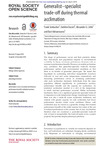Generalist specialist trade off during thermal acclimation
| dc.contributor.author | Seebacher, Frank | en_US |
| dc.contributor.author | Ducret, Varlérie | en_US |
| dc.contributor.author | Little, Alexander G. | en_US |
| dc.date.accessioned | 2016-07-18T06:49:10Z | |
| dc.date.available | 2016-07-18T06:49:10Z | |
| dc.date.issued | 2015 | en_US |
| dc.identifier.other | HPU4160443 | en_US |
| dc.identifier.uri | https://lib.hpu.edu.vn/handle/123456789/22287 | en_US |
| dc.description.abstract | The shape of performance curves and their plasticity define how individuals and populations respond to environmental variability. In theory, maximum performance decreases with an increase in performance breadth. However, reversible acclimation may counteract this generalist–specialist trade-off, because performance optima track environmental conditions so that there is no benefit of generalist phenotypes. We tested this hypothesis by acclimating individual mosquitofish (Gambusia holbrooki) to cool and warm temperatures consecutively and measuring performance curves of swimming performance after each acclimation treatment. | en_US |
| dc.format.extent | 9 p. | en_US |
| dc.format.mimetype | application/pdf | en_US |
| dc.language.iso | en | en_US |
| dc.subject | Biology | en_US |
| dc.subject | Physiology | en_US |
| dc.subject | Evolution | en_US |
| dc.subject | Performance curves | en_US |
| dc.subject | Locomotor performance | en_US |
| dc.subject | Performance breadth | en_US |
| dc.subject | Individual variation | en_US |
| dc.subject | Environmental variability | en_US |
| dc.title | Generalist specialist trade off during thermal acclimation | en_US |
| dc.type | Article | en_US |
| dc.size | 474KB | en_US |
| dc.department | Education | en_US |
Files in this item
This item appears in the following Collection(s)
-
Education [806]

